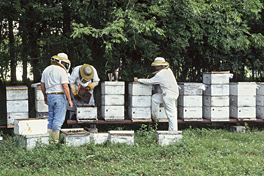|
|
Putting Honey Bees to Work for Veterans
By Kim Kaplan
June 23, 2016
BATON ROUGE, LOUISIANA, June 23—Honey bees may reduce stress and become a new business venture for those who have served in the U.S. military. That premise guides a unique partnership between the Honey Bee Breeding, Genetics and Physiology Laboratory and the Louisiana Armed Forces Foundation (LaAFF).
The lab, part of the U.S. Department of Agriculture's Agricultural Research Service (USDA-ARS), and LaAFF are hosting a June 25 workshop in Baton Rouge to introduce veterans to beekeeping.
"We want to give back to the veteran community," explained ARS researcher Michael Simone-Finstrom. "We do that by helping veterans, both new and experienced at beekeeping, learn about honey bee biology including their pests and pathogens. Then we provide hands-on experience with sustainable honey bees our lab has developed so they can raise healthy bees from the start."
This coaching builds a strong foundation for maintaining healthy colonies, and adding more healthy managed honey bees to the environment which helps all beekeepers, added Simone-Finstrom.
While honey bees may sound like an odd stress reliever for veterans, beekeeping really interests veterans, according to LaAFF cofounder Jaye Townsend.
"People regularly say that working with honey bees is therapeutic and has potential as a business opportunity. So, we met with ARS scientists, decided to hold an open house and found lots of interest in connecting veterans with bees," Townsend said.
Veterans with a wide variety of bee experience are participating in the workshop. One of the more experienced is U.S. Army veteran C.J. Oliver, whose family produces about 60 gallons of honey annually in Arnaudville, Louisiana.
"We (my family) see this workshop as a good learning experience as we've gone from hobby to secondary income to hopefully a full-time business one day," Olivier said.
ARS' Honey Bee Breeding, Genetics and Physiology Laboratory is the developer of elite honey bee strains - including bees from Russia, where factors like prolonged winters allow only the sturdiest bees to survive. Today, the Baton Rouge lab is focused on breeding for better resistance to diseases and pests that pose major problems for honey bees.
The Agricultural Research Service is the U.S. Department of Agriculture's chief scientific in-house research agency. The Agency's job is finding solutions to agricultural problems that affect Americans every day from field to table. ARS conducts research to develop and transfer solutions to agricultural problems of high national priority and provide information access and dissemination to ensure high-quality, safe food, and other agricultural products; assess the nutritional needs of Americans; sustain a competitive agricultural economy; enhance the natural resource base and the environment and provide economic opportunities for rural citizens, communities, and society as a whole.
